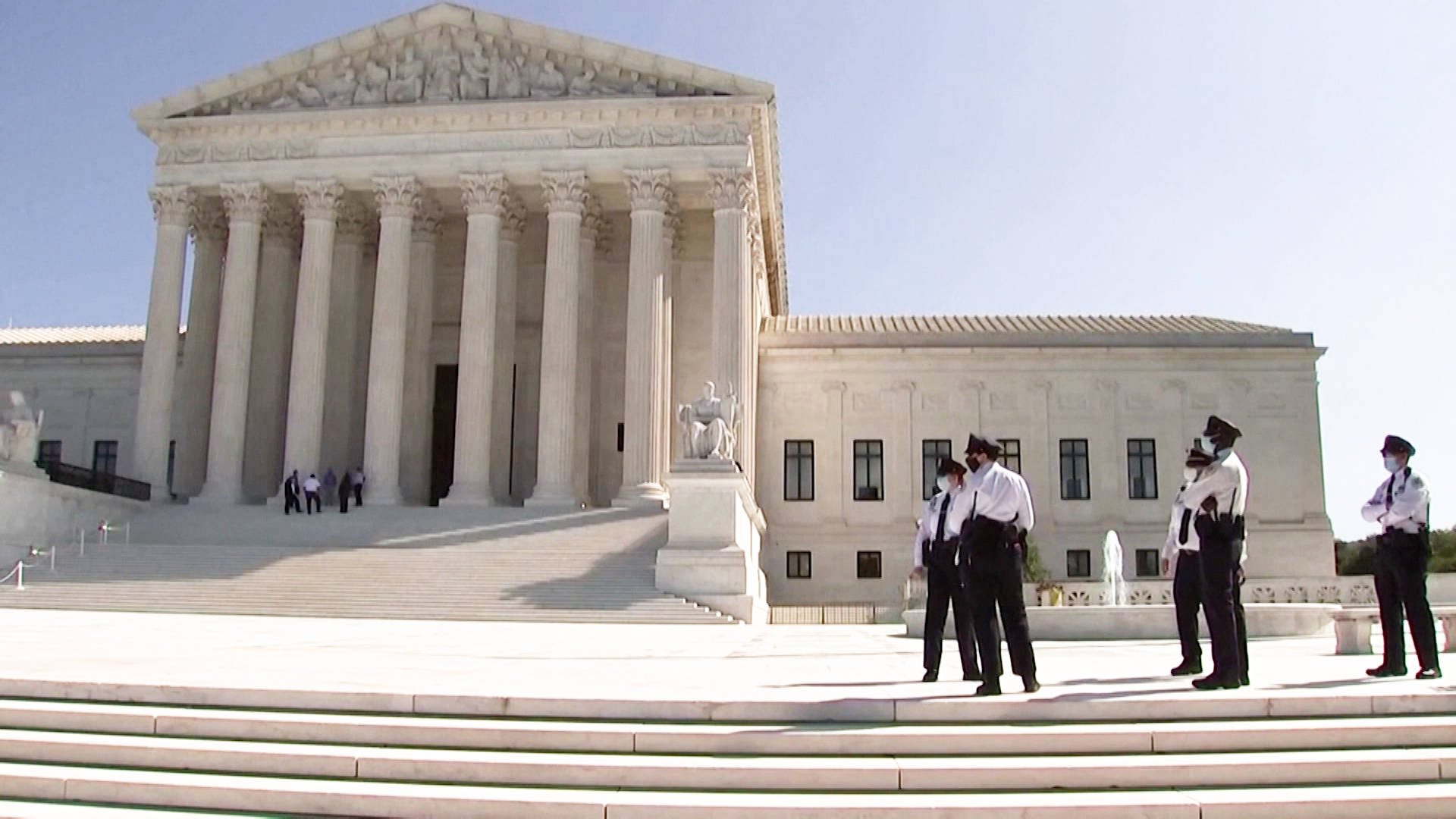
This is a rush transcript. Copy may not be in its final form.
AMY GOODMAN: In a 6-to-3 ruling, the U.S. Supreme Court has further gutted the Voting Rights Act by upholding two racially discriminatory voter laws in Arizona. The ruling is a major setback for voting rights and comes at a time when Republican state lawmakers are pushing sweeping voter suppression bills across the United States.
In her dissent, Justice Elena Kagan wrote, quote, “What is tragic here is that the Court has yet again rewritten — in order to weaken — a statute that stands as a monument to America’s greatness, and protects against its basest impulses. What is tragic is that the court has damaged a statute designed to bring about ‘the end of discrimination in voting,’” she wrote.
In a statement, President Biden criticized the ruling, saying, quote, “In a span of just eight years, the Court has now done severe damage to two of the most important provisions of the Voting Rights Act of 1965,” unquote.
Legal experts say the ruling will make it harder to challenge new voter suppression laws in court. Just last week, the Justice Department sued the state of Georgia, saying its new voter laws discriminate against Black voters.
In a second major ruling Thursday, also a 6-to-3 decision, the court struck down a California law requiring nonprofit organizations reveal the names of large donors to the state. The case was brought by the Americans for Prosperity Foundation, a right-wing group founded by the Koch brothers. Election law experts predict the ruling could lead to challenges of campaign finance disclosure laws and a surge in dark money spending on elections.
CounterPunch editor Jeffrey St. Clair summarized the court’s rulings by writing, quote, “In two decisions today, the Supreme Court restricted the ability to regulate the influence of dark money in politics and gutted voting rights. In other words, it made it easier to buy an election and harder to actually vote in one,” he said.
To talk more about these cases, we’re joined by Ben Jealous, the president of People for the American Way. He’s the former president of the NAACP and a professor of practice at the University of Pennsylvania.
Welcome back to Democracy Now!, Ben. Let us start with the first 6-to-3 decision, because they both were, gutting Section 2 of the Voting Rights Act. Can you explain exactly what the laws were in Arizona that the Supreme Court upheld?
BEN JEALOUS: Well, the most important part here is what this completes. The Shelby decision gutted Section 5. Section 5 made it possible for the U.S. Department of Justice to stop discriminatory voter laws before they went into effect. This decision guts Section 2. Section 2 makes it possible to stop a discriminatory law after it’s been proven to be discriminatory. And so, what this completes is the gutting of the most important piece of democracy legislation created in our country.
And what we should all be concerned about is that what this also sends a signal — both of these decisions together — is really that the true legacy of the Trump administration is not so much the insurrection on January 6th as it was the takeover of our courts. We now have six very conservative justices. They are stealing our democracy. They are hijacking our democracy from the top to aid and abet these Republican governors who have sought to hijack it from the bottom. And that’s where we find ourselves.
So, what’s most important here is that Section 2 has been gutted. Section 2 was, if you will, the last chance we had to really use the federal courts to stop discriminatory voting laws.
Now, the good news is that we have the For the People Act, we have the John Lewis Voting Rights Act. Both are moving, and there’s reason to be hopeful that both will be passed in this Congress. It does mean that Joe Manchin, it does mean that Kyrsten Sinema will have to find the courage to stand up and join their party in doing the right thing.
AMY GOODMAN: The New York Times describes one of the measures that the Supreme Court upheld “requires election officials to discard ballots cast at the wrong precinct. The other makes it a crime for campaign workers, community activists and most other people to collect ballots for delivery to polling places, a practice [that] critics call ‘ballot harvesting,’” but is often used in places like on Native American reservations. Ben, can you elaborate?
BEN JEALOUS: Yeah, and it’s also used with — most commonly, with senior citizens who are shut in. And, you know, this is a kind of old tradition in our democracy. It is very safe. The Republican Party has, for decades now, been trying to make a specious argument about voter fraud. Every time there’s an investigation, it’s found that statistically there is zero. There is like one case here, two cases there, out of millions of votes cast, but the impact on any election is zero.
And so, why are they doing that? Well, when you look throughout U.S. history, those who are pushing voter suppression have always talked about vote security to push vote suppression. They said that, for example, women should not be voting. This is back in the 18th century, the 19th century, the early part of the 20th century. Why? Because that would give a man with a wife two votes. Honestly, try that at home. Like, it was BS then, and they knew it, but they made that argument because they wanted to keep women from voting. Going way back, they said that white men who did not own land should not be able to vote, because they were not tied to a place and they could steal elections wherever they went. Again, they are making these specious arguments to push voter suppression.
The good news is that the majority of the people in this country — and I’m talking about by a level of about 80% — are opposed to voter suppression and are in support of the For the People Act, in support also of the John Lewis Voting Rights Act. And so, the hope, our prayer has to be that Congress and the Senate will do the right thing. It seems like Joe Manchin is heading that direction. Kyrsten Sinema is a co-sponsor of the bill. Now she just has to have the courage to actually make it possible for her to vote for the bill that she supports.
AMY GOODMAN: And, very quickly, the whole issue of dark money in politics in California, nonprofits not having to reveal who their funders are, why this could so grievously affect elections?
BEN JEALOUS: Yeah, so, you know, this is really pushed by the Koch brothers. They are the ones who are — Charles Koch is leading the charge to attack the For the People Act, that would require disclosure. He founded AFP, that brought this lawsuit. They manufacture things that most of the country buys. And what they don’t want you to know is that the Kochs stand directly behind efforts to suppress the vote, and so they’re trying to keep that quiet.
What’s also concerning is that many of these groups train judges. And so you see the kind of boldness of their corruption, because, frankly, when you go back in kind of any right-wing judge’s history, they typically have been to one of these trainings. So you very likely had Supreme Court justices rule to keep quiet the list, ultimately, of the donors who paid for them to be trained to assist those donors and their companies, like Koch Industries.
AMY GOODMAN: And finally, Ben Jealous, you have been a longtime anti-death penalty activist, as head of the NAACP and more. I want to ask you about the news that the Justice Department is pausing federal executions while it reviews its policies. In a memo dated Thursday, Attorney General Merrick Garland cites, quote, “arbitrariness in its application, disparate impact on people of color, and the troubling number of exonerations in capital and other serious cases.” Garland also ordered a review of the lethal injection drugs used to kill condemned prisoners. Can you comment on this?
BEN JEALOUS: Look, it’s good news. It gets us in line with every other Western democracy and most countries on planet Earth.
The other thing is that we really have to really be concerned about poor people of all colors. When you visit death row — and I’ve been to many death rows — yes, they tend to be disproportionately people of color. They are almost exclusively people who were too poor to afford their own lawyer. When you go down the list of people who were likely innocent when they were executed in this country, virtually all of them were too poor to afford their own lawyer.
This is good news for everybody who believes that whether you are rich or poor, Black or white, male or female, or simply no matter what ZIP code you were born in, because there’s great discrimination there, too, that you deserve equal justice in this country and that we should lead the world in human rights. It’s an embarrassment that we still have the death penalty in this country. Every other Western democracy has long since dispensed with it.
AMY GOODMAN: Ben Jealous, I want to thank you so much for being with us, president of People for the American Way, former president of the NAACP.
Next up, the family business of Donald Trump faces criminal charges for operating a 15-year tax fraud scheme. Could this lead to charges against the former president? We’ll speak to Pulitzer Prize-winning journalist David Cay Johnston. Stay with us.








